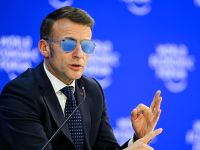The Trump administration is ratcheting up economic pressure on Tehran, slapping additional sanctions on businesses and key officials suspected of facilitating illicit Iranian oil and petrochemical sales.

Despite Iran’s seeming resilience, Iranian President Hassan Rohani revealed that a renewal of US sanctions had deprived Tehran of as much as $200 billion in income and investment opportunities.
Washington and Tehran may have de-escalated military tensions following last month’s assassination of Iranian Major-General Qassem Soleimani in Baghdad in a US missile strike and subsequent Iranian missile attacks on bases in Iraq where US troops were stationed but the Trump administration is determined to continue hollowing out Iran’s economy.
The latest US efforts focused on Asian and Gulf companies serving as middlemen allegedly aiding Tehran’s efforts in circumventing sanctions to get Iranian crude and petrochemicals to buyers, primarily in China.
Since the Trump administration reintroduced sanctions on Iranian crude and oil product exports in November 2018 and followed that in May 2019 by removing waivers for Tehran’s top crude buyers, Iran’s main source of revenue has dramatically dwindled.
From pre-sanctions crude export levels of 2.5 million-2.7 million barrels per day (bpd), Iran is reportedly currently averaging crude exports of 250,000-400,000 bpd.
In a speech December 31, Rohani claimed the renewed US sanctions cost Iran $100 billion in oil income and another $100 billion in foreign investment credit. He said: “Iran would have earned $200 billion surplus income… if the country were not involved in an economic war.”
The US Treasury and State departments announced on January 23 sanctions against six petroleum and petrochemical companies and two individuals for allegedly helping Iran conceal the origin of Iranian crude, petroleum products and petrochemicals sold in defiance of US sanctions and ordering millions of dollars’ worth of Iranian products on behalf of Iranian state oil firm National Iranian Oil Company (NIOC).
The Treasury Department stated it was sanctioning Hong Kong-based broker Triliance Petrochemical Company, Hong Kong-based Sage Energy HK, Shanghai-based Peakview Industry Company and Dubai-based Beneathco DMCC.
“Iran’s petroleum and petrochemical industries are major sources of revenue for the Iranian regime and fund its malign activities throughout the Middle East. The entities targeted today facilitate Iran’s petrochemical and petroleum exports in contravention of US economic sanctions,” the department said.
The Treasury Department accused Triliance of ordering the transfer of millions of dollars in payments to NIOC for Iranian crude, petroleum products and petrochemicals shipped to the United Arab Emirates and China in 2019. The department claimed Sage Energy, Peakview and Beneathco ordered the equivalent of millions of dollars for exports from Iran after US sanctions waivers expired last May.
The sanctions include freezing all assets held by the companies that come under US jurisdiction and generally bar American companies and individuals from doing business with them.
The State Department said it was sanctioning Triliance as well as Chinese firm Shandong Qiwangda Petrochemical Company and Hong Kong-based Jiaxing Industry Hong Kong for a “significant transaction” of petrochemical products sold by Iran. The department said it was sanctioning Triliance Managing Director Ali Bayandarian and Shandong Qiwangda Chairman Zhiqing Wang.
China remains a favoured destination for Iran’s crude exports and Washington is hoping to stem those Chinese-dedicated sales. In a January 12 interview on Fox News, US Treasury Secretary Steve Mnuchin said: “I sat down with the Chinese officials… They’ve cut off all of the state companies from buying oil and we’re working with them to make sure that they cease all additional oil activities.”
Following the January 8 Iranian strikes on military bases in Iraq, the Trump administration unveiled sanctions on multiple sectors of the Iranian economy, including construction, manufacturing, textiles and mining, as well as on eight top Iranian officials.
Since June, the administration has sanctioned Iran’s largest petrochemical holding company and its subsidiaries, the country’s largest shipping company, its national bank as well as individuals and entities associated with the Islamic Revolutionary Guard Corps’ al-Quds Force.
The United States also levelled sanctions on Iranian Supreme Leader Ayatollah Ali Khamenei, members of his inner circle and Foreign Minister Mohammad Javad Zarif.
Since the Trump administration pulled out of the 2015 international treaty designed to limit Iran’s nuclear programme in 2018, the United States has attempted to force Tehran to the negotiating table for a new deal by inflicting as much financial pain as possible through successive rounds of sanctions.
Iran insists that it will only negotiate if Washington returns to the 2015 pact and lifts its sanctions on Tehran.
In a January 24 interview with German magazine Der Spiegel, Zarif emphasised that Iran was willing to negotiate with Washington, saying: “The Trump administration can correct its past, lift the sanctions and come back to the negotiating table. We’re still at the negotiating table.” In response, US President Donald Trump tweeted on January 25: “Iranian Foreign Minister says Iran wants to negotiate with the United States but wants sanctions removed. No Thanks!”








